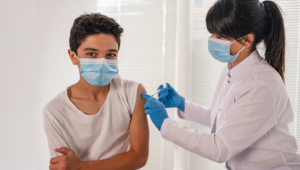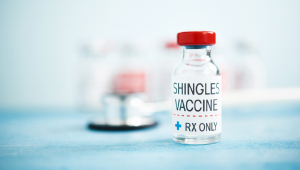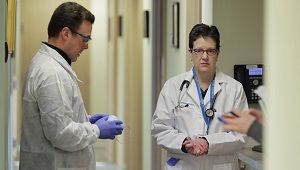Lisa A. Jackson, MD, MPH
Biography
Lisa A. Jackson, MD, MPH, is an internist and infectious disease epidemiologist who has conducted clinical and epidemiologic studies of vaccine safety and efficacy since 1991.
Dr. Jackson is the principal investigator (PI) of KPWHRI’s Vaccine and Treatment Evaluation Unit — one of 10 network sites that the National Institutes of Health (NIH) sponsors. In this role, she leads the phase 1 clinical trial of the COVID-19 vaccine co-developed by Moderna and NIH. Launched in March 2020, this trial was the first in the world to begin testing a COVID-19 vaccine. She is also leading the phase 3 clinical trials of the COVID-19 vaccines developed by Moderna and NIH and by Janssen Pharmaceutical Companies, part of Johnson & Johnson, at KPWHRI.
Additionally, Dr. Jackson serves as KPWHRI’s principal investigator in the Vaccine Safety Datalink Project (VSDP). Sponsored by the Centers for Disease Control and Prevention (CDC), VSDP conducts ongoing research on the safety of licensed vaccines in routine use.
Dr. Jackson has written more than 200 peer-reviewed publications and 14 book chapters. She is a past member of the Food and Drug Administration’s Vaccines and Related Biological Products Advisory Committee and the National Vaccine Program Office’s National Vaccine Advisory Committee.
After receiving her medical degree from the University of Virginia School of Medicine, in Charlottesville, Dr. Jackson earned her Master of Public Health (MPH) degree at the University of Washington (UW) School of Public Health. She completed her internal medicine residency training at the UW School of Medicine and served as an epidemic intelligence officer and preventive medicine resident at the CDC.
Research interests and experience
Vaccines & Infectious Diseases
Vaccine safety; COVID-19 vaccine safety and effectiveness; influenza vaccine effectiveness in the elderly; methodologic issues in vaccine effectiveness evaluations; pneumococcal polysaccharide vaccine effectiveness; pneumococcal conjugate vaccine immunogenicity in the elderly; epidemiology of E. coli bacteremia; epidemiology of community-acquired pneumonia
Recent publications
Grayston JT, Jackson LA, Kennedy WJ, Kronmal RA. Secondary prevention trials for coronary artery disease with antibiotic treatment for Chlamydia pneumoniae-design issues. Am Heart J. 1999;138(5 Pt 2):S545-9. PubMed
Spach DH, Jackson LA. Bacterial meningitis. Neurol Clin. 1999;17(4):711-35. PubMed
Jackson LA, Stewart DK, Wang SP, Cooke DB, Cantrell T, Grayston JT. Safety and effect on anti-Chlamydia pneumoniae antibody titers of a one-month course of daily azithromycin among adults with coronary artery disease. J Antimicrob Chemother. 1999;44(3):411-4. PubMed
Nichol KL, Mendelman PM, Mallon KP, Jackson LA, Gorse GJ, Belshe RB, Glezen WP, Wittes J. Effectiveness of live, attenuated intranasal influenza virus vaccine in healthy, working adults: a randomized controlled trial. JAMA. 1999;282(2):137-44. PubMed
Jackson LA, Holmes SJ, Mendelman PM, Huggins L, Cho I, Rhorer J. Safety of a trivalent live attenuated intranasal influenza vaccine, FluMist, administered in addition to parenteral trivalent inactivated influenza vaccine to seniors with chronic medical conditions. Vaccine. 1999;17(15-16):1905-9. PubMed
Jackson LA, Smith NL, Heckbert SR, Grayston JT, Siscovick DS, Psaty BM. Lack of association between myocardial infarction and past use of erythromycin, tetracycline, or doxycycline. Emerg Infect Dis. 1999;5(2):281-4. PubMed
Jackson LA, Benson P, Sneller VP, Butler JC, Thompson RS, Chen RT, Lewis LS, Carlone G, DeStefano F, Holder P, Lezhava T, Williams WW. Safety of revaccination with pneumococcal polysaccharide vaccine. JAMA. 1999;281(3):243-8. PubMed
Pearson D, Jackson LA, Winkler B, Foss B, Wagener B. Use of an automated pharmacy system and patient registries to recruit HMO enrollees for an influenza campaign. Eff Clin Pract. 1999;2(1):17-22. PubMed
Jackson LA, Grayston JT. Chlamydia pneumoniae. In: Yu VL, Merigan TC Jr, Barriere, eds. Antimicrobial Therapy and Vaccines. Baltimore: Williams & Wilkins, 1999:583-586. PubMed
Jackson LA, Marcuse EK. Measles. In: Burg FD, Ingelfinger JR, Wald ER, Polin RA, eds. Current Pediatric Therapy, Vol 16. Philadelphia: W.B. Saunders Company, 1999:123-6. PubMed
News

Vaccine program recruiting volunteers in Seattle area
KPWHRI’s vaccine registry was the first to enroll participants in a clinical trial of a COVID-19 vaccine.
News

Clinical trial will evaluate mpox vaccine for adolescents
The NIH-sponsored trial will help inform decisions about vaccine approval for 12- to 17-year-olds.
Research

New study confirms safety of shingles vaccine
KPWHRI researchers analyzed data from more than 640,000 vaccine doses to understand risk of severe reactions.
Research

‘Fighting back’ against COVID-19: Remembering a historic trial
Lisa Jackson, MD, MPH, Kaiser Permanente Washington senior investigator, recounts the genesis of a groundbreaking vaccine.



